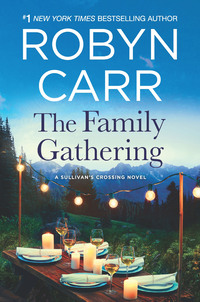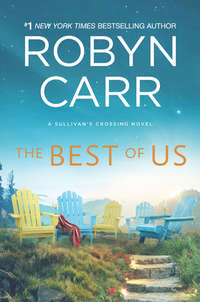
Полная версия
A Virgin River Novel
He stood there a minute. It had taken him about five seconds to conclude someone—ninety-eight-percent chance a boyfriend or husband—had belted her in the face and she was on the run with her kid. It wasn’t like he didn’t know that stuff happened. It happened all the time. He just never understood what satisfaction a man could get out of hitting a woman. It made no sense to him. If you have a pretty young woman like that, you treat her right. Hold her safe against you and protect her.
He went to the bar, turned off the lights, checked the kitchen, leaving a light on in case she came downstairs, then went to his apartment behind the kitchen. He was only there a few minutes when it occurred to him that there were no longer clean towels up there—he’d emptied the bathroom and moved all his downstairs. He went to the bathroom, gathered up a stack of clean white towels and went back upstairs.
The door was open a crack, like maybe she’d already been down to the kitchen. He could see a glass of orange juice sitting on the bureau inside the door and it pleased him that she’d helped herself. Through that space of an inch, he saw her reflection in the bureau mirror. Her back faced the mirror and she had pulled her bulky sweatshirt up over her head and shoulders, trying to get a glimpse of her back and upper arms in the mirror. She was covered with bruises. Lots of big bruises on her back, one on her shoulder and upper arms.
Preacher was mesmerized. For a moment his eyes were locked on those purple splotches. “Aw, Jesus,” he whispered in a breath.
He quickly backed away from the slit in the door and got up against the wall outside, out of sight. It took him a moment to collect himself; he was stricken. Horrified. All he could think was, what kind of animal does something like that? His mouth hung open because he couldn’t imagine this. He was a warrior, a trained fighter, and he was pretty sure he hadn’t done that much damage to a man equal to him in size, in a fair fight.
Some instinct kicked in that told him he shouldn’t let on that he’d seen. She was already afraid of everything, including him. But there was also the reality that this wasn’t a woman who’d been smacked. She’d been pummeled. He didn’t even know the girl, yet all he wanted was to kill the son of a bitch who’d done that to her. After five or eleven months of beatings, then death for the sorry bastard.
She shouldn’t know he was feeling that; it would scare her to death. He took a few deep breaths, composed himself. Then he tapped lightly on the door.
“Huh?” he heard her say, sounding startled.
“Just some towels,” he said.
“One second, okay?”
“Take your time.”
Momentarily she opened the door a tiny bit farther, her sweatshirt back in place.
“I forgot, I took all the bathroom stuff out,” he said. “You’ll need some towels. I’ll leave you alone now. Won’t bother you again.”
“Thank you. John.”
“No problem. Paige. Get some good rest.”
Paige pulled the bureau carefully, as quietly as possible, in front of the door. She really hoped John hadn’t heard that, but as close as she could figure out, the kitchen was right beneath this room. And—if the man meant her or Christopher any harm, he could have already delivered it, not to mention that a locked door and empty bedroom dresser couldn’t possibly keep him out.
As much as she’d have liked a hot soak in a tub, she felt too vulnerable to get naked. She couldn’t talk herself into the shower, either—she might not hear the doorknob rattle or Christopher call out to her—so she washed up in the sink and put on clean clothes. Then, leaving the bathroom light on, she lay carefully on the bed, on top of the covers. She knew she wouldn’t sleep, but after a little while she calmed down. She stared at the ceiling, the wood slats forming a perfect V over her head. What came to mind was that this was the third time in her life she’d lain in bed looking at such a ceiling.
The first time was in the house she grew up in—the beams were bare, pink insulation puffing out between them. The house was small, only two bedrooms, and already old when her parents moved in, but the neighborhood had been clean and quiet then, twenty years ago. Her mother moved her into the attic when she was nine; she shared her space with boxes of stored household goods pushed back against one wall. But it was her space, and she escaped to it whenever she could. From her bed she could hear her mother and father arguing. After her father’s death when she was eleven, she could hear her older brother, Bud, argue with their mother.
From what she had learned about domestic battery in the last few years, she should have expected to end up with an abuser, even though her father never hit her or her mother, and the worst she ever got from Bud was a shove or slug in the arm. But man, could the men in her family yell. So loud, so mad, she wondered why the windows didn’t crack. Demand, belittle, insult, accuse, sulk, punish with the meanest words. It was just a matter of degrees; abuse is abuse.
The next time she had found herself staring at a ceiling like this one was after she left home. She’d gone to beauty school after high school and stayed home with her mother, paying rent, until she was twenty-one. Then she and two girlfriends—also beauticians—rented half an old house. Paige had happily taken the attic bedroom, though it wasn’t even as large as her childhood room and most of the time she had to crouch to keep from hitting her head on the slanted walls.
Tears came to her eyes because she remembered those two years with Pat and Jeannie as the happiest in her life. Sometimes she missed them so much it made her ache. Three hairdressers, mostly broke after rent, food and clothes—it had seemed like heaven. When they couldn’t afford to go out, they’d buy popcorn and cheap wine and make a party of it at home, gossiping about women whose hair they cut and frosted, about boyfriends and sex, laughing till they couldn’t sit up straight.
Then Wes came into her life, a successful businessman, six years older. It was shocking to realize he’d been the age she was now—twenty-nine. Yet he’d seemed so worldly, mature. She’d been styling his hair for only a couple of months when he asked her out and took her to a restaurant so fine the hostesses were better dressed than she was. He drove a brand-new Grand Prix with cushy leather seats, darkly tinted windows. And he drove too fast, which at twenty-three didn’t seem dangerous. It was thrilling. Even though he yelled at and flipped off other drivers, it seemed his right—he was powerful. By her standards, rich.
He had a house already, which he didn’t even have to share with roommates. His career was trading stocks and commodities; an exhausting job that required brilliance and high energy. He wanted to go out every night, bought her things, pulled his wallet out of his pocket and said, “I don’t know what you really want, what little thing would just make you cry it’s so perfect, so I want you to shop for yourself. Because you being happy is the only thing that matters to me in the world.” He’d peeled off a couple of bills and handed her two hundred dollars, a veritable fortune.
Pat and Jeannie didn’t like him, but there was hardly a mystery in that. He wasn’t all that nice to them. He treated them like wallpaper, furniture. Answered their questions with one word when he could. In fact, she couldn’t remember what they said about him when they tried to warn her off.
Then came the insanity of her life spiraling out of control that to this day seemed impossible: he’d hit her before they married, and she’d married him anyway. They’d been in his fancy car, parked, having an argument about where she was living—he thought she’d be better off at home with her mother rather than that old half a house in a questionable neighborhood with a couple of dykes. It got pretty nasty; she’d said her share of ugly things to him. He said something like, “I want you with your mother, not in some little whorehouse in the ghetto.”
Just who the fuck do you think you are, calling where I live a whorehouse?
How do you use that language with me?
You called my best friends dykes and whores and it’s my language you criticize?
I’m just thinking about your safety. You said you wanted to marry me someday, and I’d like you to still be around when that happens!
Well up yours, because I love living there and you can’t tell me what to do! And I’m not marrying anyone who can talk about my best friends like that!
There was more. More. She vaguely remembered calling him a bad name, like prick or asshole. He called her a bitch, a difficult bitch. In any case, they both contributed, she was sure of that.
He’d slapped her, open palm. Then he immediately broke down, collapsed, cried like a baby, said he wasn’t sure what had happened to him, but maybe it was because he’d never been in love like this before. It was wrong, he knew it was wrong to overreact that way, he was crazy, he was ashamed. But… he wanted to hold her in his arms every night, take care of her for the rest of her life, never lose her. He apologized for what he’d said about the roommates—maybe he was jealous of how loyal she was to them. In his mind he couldn’t see past her; there was no one in his life he valued like he valued her. He loved her so much it made him nuts, he said. She was the first person he’d ever felt that way about. Without her, he was nothing!
She believed him. But she never used profanity around him again.
She hadn’t told Pat and Jeannie because even though she was stupid about what was happening, she knew better than to risk their further disapproval. It only took her a couple of days to get over that slap. It wasn’t much of a slap. It didn’t take more than a month for her to almost forget it happened and trust him again; she thought him handsome, exciting, sexy. He was edgy and confident. Smart. Passive men couldn’t get the kind of success he had. She wasn’t attracted to passive men.
Then he said, “Paige, I don’t want to wait. I want us to get married as soon as you’re ready. A nice wedding—screw the cost, I can afford whatever you want. Ask Pat and Jeannie to stand up for us. And you can quit your job—you don’t have to work anymore.”
Her legs hurt; she was getting bunions. Fixing hair six days a week was no easy job, even though she had liked it. She’d often thought how much more she’d like it if she only had to do it about six hours a day, four days a week, but that seemed an impossible dream. She could barely make ends meet as it was, and her mother had been working two jobs since her father died. In her mother, she saw her future—alone, weak and worked to death. A picture of her surly roommates wearing pretty satin at her wedding, smiling, envious of her good fortune and the cushy life she’d have. And she’d said yes.
He hit her again on the honeymoon.
Over the next six years she’d tried everything—counseling, police, running away. He got out of jail right away, if they even bothered to take him in; he found her in hiding, and it just got worse. Even her pregnancy and Christopher’s arrival hadn’t stopped the abuse. She discovered by accident that there might be a little more to this equation—a certain chemistry that gave him such energy to work those long hours and wear himself out keeping track of her, the fits of euphoria, the skull-splitting temper—some white powder in a small vial. Cocaine? And he took something his personal trainer gave him, though he swore it wasn’t steroids. A lot of traders used amphetamines to keep up with the demands of the job. Cocaine users tended to be reed-thin, but Wes was proud of his body, his build, and worked hard on his muscles. A coke and steroid regimen, she realized, could make his temper hair-trigger short. She had no idea how much, how long. But she knew he was crazy.
This was her last chance. Through a shelter she’d met a woman who said she could help her get away, change her identity and flee. There was an underground for battered women and children in hopeless situations. If she and Christopher could just get to the first contact, they would be passed along from place to place, collecting new ID, names, histories and lives along the way. The upside was—it worked a lot. It was nearly foolproof when the woman followed instructions and the children were young enough. The downside was, it was illegal, and for life. Life like this, covered in bruises, afraid she’d be killed every day—or a life of being someone else, someone who isn’t hit?
She started squirreling away money from her grocery allowance and packed a bag that she hid with a contact from a shelter. She managed almost five hundred dollars and fully intended to get herself and Christopher out before another bad episode occurred. With the last beating, she knew she was nearly too late.
And here she was, looking at her third V-shaped ceiling. She knew she wouldn’t sleep; she’d hardly slept in six years. No worries about the drive—with so much adrenaline going on, she’d make it.
But then she woke up to sunlight and a regular thwacking noise outside. Someone was chopping wood. She sat up cautiously and smelled coffee. She had slept after all. And so had Christopher.
The dresser was still pushed against the door.
Two
Preacher barely slept. He spent half the night on the computer. It was like this little machine was invented for him, because he liked to look things up. He had been trying to get Jack to put the inventory and receipts on the computer, but Jack had a clipboard that was like an extension of his arm and wanted nothing to do with Preacher’s technology. It was slow, there being no cable hookup out here, but he was patient. And it got the job done.
The rest of the night was spent trying to catch some sleep, which eluded him completely. He got out of bed several times and looked out the back window to see if the little Honda was still there. He finally got up for the day at five, when it was still black as pitch outside. He went into the kitchen, started the coffee, laid a fresh fire. There was no sound from upstairs.
The rain had stopped, but it was overcast and chilly. He’d have liked to go ahead and split logs, work off some aggression, but Jack liked doing that, so he let it go. At six-thirty, Jack came into the bar, all smiles. This was the happiest man in Virgin River since he got married. It was as if he couldn’t stop grinning.
Preacher stood behind the bar with his coffee mug and lifted his chin in greeting to his best friend. “Hey,” Jack said. “Good rain.”
“Jack,” he said. “Listen. I did something…”
Jack shrugged out of his jacket and hung it on the peg inside the door. “Pee in the soup again, Preacher?”
“I got a woman upstairs…”
Pure shock settled over Jack’s face. Preacher didn’t have women around. He didn’t prowl, didn’t flirt, didn’t do any of that. Of course, Jack didn’t really know how he lived like that, but this was Preacher. When the guys, the Marines they had served with, were all out looking for women to pass the night with, Preacher stayed behind. They jokingly called him the Big Eunuch. “Oh, yeah?” he asked.
Preacher took down a mug and filled it for Jack. “She came in last night, during the storm,” he said. “She’s got a kid with her—little,” he said, measuring with his huge hands. “Kid might be coming down with something. He’s got a fever, she said. I gave her my old room because there’s no place to stay around here….”
“Well,” Jack said, picking up his coffee. “That was nice of you. I guess. She steal the silver or anything?”
Preacher made a face. They didn’t have silver; the only thing worth stealing was the cash, locked up tight. Or liquor—way too much trouble for a woman with a kid. Not that any of that ever crossed his mind. “She’s probably in some trouble,” Preacher said. “She’s got… Looks like maybe she’s been in some trouble. Maybe she’s running or something.”
Again, Jack was shocked. “Huh?”
Preacher stared hard into Jack’s eyes. “I think she needs some help,” he said, when in fact he knew she needed help. “She’s got a bruise on her face.”
“Oh, boy,” Jack said.
“Mel coming in to Doc’s?” he asked.
“Of course.”
“She needs to have a look at the kid—make sure he’s not sick. You know. And the woman—Paige—she says she’s all right, but maybe… Maybe Mel can—I don’t know—be sure.”
“Yeah,” Jack said, taking a sip from his mug. “Then what?”
Preacher shrugged. “She’s gonna want to get out of here, I think. She’s all skittish. She seems scared. I want her to at least see Mel.”
“Probably a good idea.”
“Yeah. That’s what we’ll do. Ask her to let Mel have a look. But I can’t make her, you know. I think you should do it. Talk to her, suggest it to her….”
“Nah, Preach, you can handle this. It’s your deal—I haven’t seen her or anything. You just talk to her. Quiet and soft. Try not to scare her.”
“She’s already scared, which is how I figure she’s in some trouble. The kid hasn’t seen me yet, though—he was asleep. He’ll probably run screaming.”
At seven-thirty Preacher fixed up a tray with some cereal in bowls, toast, coffee, orange juice and milk. He went up the back stairs and gently tapped on the door. It opened immediately. Paige had showered and dressed. She wore the same jeans and a long-sleeved chambray shirt. A little black-and-blue spot peeked out from the opened collar and Preacher immediately felt steamed up, but he tried to keep it from showing on his face. Instead, he focused on her eyes, which were a deep emerald-green, and her damp hair, which fell in curly tendrils to her shoulders. “Morning,” he said, trying to keep his voice quiet and soft, like Jack would.
“Hey,” she said. “You’re up early.”
“I’ve been up forever,” he said.
“Mom?” came a voice from behind her. He looked past her and saw the little kid, Christopher, sitting cross-legged in the middle of the bed.
She opened the door for Preacher and he came in, putting the tray on the bureau just inside the door. He stayed by the door and gave the kid a nod. He tried to relax his features into softness, but wasn’t sure how to do that. “Hey, little buddy. You want some breakfast?”
The kid shrugged, but his round eyes were wide and focused on Preacher.
“He’s not so good with men,” Paige whispered softly. “Shy.”
“Yeah?” Preacher asked. “Me, too. Don’t worry—I’ll stay back.”
He looked at the child and tried out a smile. Then the kid pointed at Preacher’s head and said, “You hafta shabe that?”
It made Preacher laugh. “Yeah. Wanna feel?” he asked. He approached the bed slowly, carefully, bending his bald head toward the kid. He felt a small hand rub over his dome and it made him laugh again. He raised his head and said, “Cool, huh?” And the kid nodded.
Preacher went back to Paige. “My buddy’s wife, Melinda, she’s coming to Doc’s this morning and I wanna take you over there. Let her have a look at the kid, make sure he’s okay, and if he needs medicine or anything, she’ll fix you right up.”
“She’s a nurse, you say?”
“Yeah. A special nurse. A midwife. She delivers babies and that.”
“Oh,” Paige said, a little more interested. “That’s probably a good idea. But I don’t have much money—”
He laughed. “We don’t worry about things like that around here, if someone could use a little help. It’ll be fine.”
“If you’re sure…”
“It’s all good. Come on downstairs when you’re ready. Mel will be over there about eight, but take your time. Not too many people get sick around here and they’re not usually busy.”
“Okay. Then we’ll press on….”
“Um, if you need to, you can stay a couple of days. I mean, if he’s not feeling so well. Or, if you’re tired from driving.”
“I’ll probably just get back on the road.”
“Where you headed?” he asked. “You never mentioned.”
“Just a little farther. I have a friend… We’re going to visit a friend.”
“Ah,” he said, but if it had been just a little farther, she’d have kept going. “Well, you think about it. Open offer.”
While Christopher sat cross-legged on the bed to eat cereal, Paige leaned toward the mirror, dabbing makeup on her purple cheek, covering it as best she could. It had at least lightened somewhat. But there was nothing she could do about the split lip, which was scabbing over. Christopher would touch it and say, “Mommy’s owie.”
Her mind wandered back to that last beating. The part that still shook her was not being able to remember what had really started it. Something about Christopher’s toys being strewn all over the family room, and then Wes’s suit not back from the dry cleaners. He wasn’t happy about what she’d made for dinner. Or was it what she had said about the toys? “Jesus, Wes, he has toys—he plays with them. Just give me a minute.” Had he slapped her then? No, right after that, when she muttered, under her breath, “Don’t get excited, don’t get mean, just let me do it…”
How could she not know that he’d react like that? Because she never knew how he would react. They’d had months of no violence. But she had seen it in his eyes when he came home from the office. It was already there—eyes that said, I’m going to hit you and hit you and hit you some more and neither of us will know exactly why. As usual, by the time she zoned in on that dangerous gleam, it was too late.
She had started spotting then, in danger of losing the baby—the new baby that she’d recently told him about. Big surprise—since he had kicked her. So she dragged herself out of the bed and went to pick up Christopher at day care. The girl behind the desk, Debbie, had gasped when she saw Paige’s face. Then she stammered, “M-Mr. Lassiter asked us to call him if you came for Christopher.”
“Look at me, Debbie. Maybe you could forget to call him. Just this once. Maybe for a while.”
“I don’t know…”
“He’s not going to hit you,” she had said boldly.
“Mrs. Lassiter, maybe you should call the police or something?”
And Paige had laughed hollowly. Right. “I guess you think I haven’t.”
At least she’d gotten out of town. With her one suitcase, almost five hundred dollars and an address in Spokane.
And here she was, waking up under another V-shaped ceiling. Still scared to death, but at least in the moment, apparently safe.
While Christopher ate, she poked around a little, not touching anything. It wasn’t a real big room, but there was enough space for Preacher’s bench and weights. She looked at a couple of barbells on the floor—sixty pounds each. On the press he had stacked four hundred pounds; Wes had bragged incessantly about his two-fifty.
There was a medium-size bookcase against the wall, full, books stacked on the floor beside it and on top. She held her hands behind her back; force of habit—Wes didn’t like her touching his things, except his dirty laundry. Weird titles—the biography of Napoléon, World War Two warplanes, medieval armies. Hitler’s Occupation—that sent a chill through her. Most of them were pretty worn, old. Some new. She couldn’t spot a fiction title—all nonfiction, all military or political subjects. Maybe they had belonged to his father or an uncle. He didn’t exactly look like a big reader, though he sure looked like a weight-lifter.
When Chris was done with his breakfast, she put on his jacket, then her own, picking up the quilted bag to hang over her shoulder. She left the suitcase, packed, on the bed and carried the breakfast tray down the back stairs. John was in the kitchen wearing an apron, flipping sausage patties, an omelet pan steaming over a high flame. “Go ahead and set that down right on the counter and give me one minute,” he said. “I’ll walk you over.”
“I could wash these up,” she said meekly.
“Nah, I got it.” Paige watched as he pressed the patties with his big spatula and sprinkled cheese on the omelet, then deftly folded and flipped it. Toast popped up, was buttered and everything put on a large oval plate. He took off his apron and hung it on a hook. He was wearing jeans and a black T-shirt that was stretched so tight across the broad expanse of his chest it looked like it should split. The biceps on the man were like melons. If he’d been wearing a white T-shirt, he’d look like Mr. Clean.










